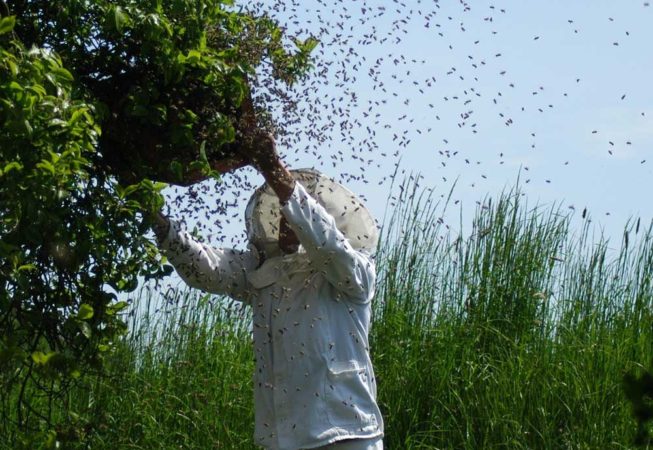Keeping Bees in May
It is still spring in May, and Oregon spring weather is known for changing quickly. The old saying, “If you do not like the weather, wait a minute” applies. Honey bees are ready for good weather; they want to forage and gather lots of nectar and pollen for their colony. Colonies grow quickly when foraging is good. This can lead to swarming, something that beekeepers like to control so that they do not lose production and/or colonies.
This time of year, colonies can also be more susceptible to robbing. Larger colonies will use up stores more quickly and can find it easier to take from smaller colonies that may have few defenders to protect food supplies.
If several bad weather days occur in a row, colonies may run out of food. As bees die and fall to the bottom board, the entrance can become blocked. When this happens, the bees may be confined to the hive even when the weather improves. If the beekeeper does not intervene soon enough, the colony will starve. After I lost one of my largest spring colonies to this problem, I now make sure my bees have an upper entrance. I also check and clean entrances often.
Entrances can become busy in spring as colonies grow. A busy entrance may also be caused by invaders from other colonies, robber bees. Look closely at the behavior of the bees at the entrance. Are bees coming and going normally, or is there fighting at the entrance? You can also see dead bees at the entrance or in front of the hive when the activity is created by robber bees. If you suspect robbing, you can reduce the entrance of the colony being invaded. However, the best solution may be to move the colony under attack. Remember, a new location must be at least 3 miles away.
Contact with other beekeepers can be very helpful when new locations are needed for whatever reason. A good place to meet other beekeepers can be beekeeping classes, bee lectures, and association meetings. Bee problems are not restricted to new beekeepers. Having contacts and talking with others is good for all of us. So, join associations and go to meetings (both local and state); also read your newsletters.
Where you locate a colony is a good question to solve before your bees arrive. Bees like a sunny location, floral and water sources nearby.
If you will have the bees where neighbors are close, it is best to discuss with your neighbor before the bees arrive. Respect the fear that they may have of bees. Also remember that bee dropping can be a problem for neighbors close by.
A jar or two of honey can be helpful in many situations.
Lynn Royce

